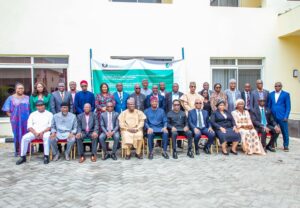WEST AFRICA ON RED ALERT: Hydrological and Meteorological Experts Raise Climate Alarm, Call for Urgent Regional Action . By Raymond Enoch


 In a powerful convergence of voices from across West Africa, Minister, Scientists, and regional meteorological leaders have issued a resounding call for climate resilience, warning of intensifying weather threats and urging immediate investment in early warning systems of meteorological and hydrological services across ECOWAS member states.
In a powerful convergence of voices from across West Africa, Minister, Scientists, and regional meteorological leaders have issued a resounding call for climate resilience, warning of intensifying weather threats and urging immediate investment in early warning systems of meteorological and hydrological services across ECOWAS member states.
Speaking at the opening ceremony of the 14th Meeting of Directors of National Meteorological and Hydrological Services (NMHSs) of the ECOWAS sub-region in Abuja, Nigeria’s Minister of Aviation and Aerospace Development, Festus Keyamo (SAN), cautioned that the region is entering an unprecedented era of climate-related disasters. He cited erratic rainfall, prolonged droughts, destructive storms, rising temperatures, and flooding as growing threats to lives, food security, and economies.
“Now more than ever in recorded history, West Africa is under threat. These climate challenges are not just environmental—they are economic, social, and deeply human,” said Keyamo, representing President Bola Ahmed Tinubu. Asking the pressing question, “Climate Change: How Ready is ECOWAS?”, he called on participants to explore innovative pathways toward improving lives across the sub-region.
Welcoming delegates, Prof. Charles Anosike, Director-General of the Nigerian Meteorological Agency (NiMet), emphasized the need to leverage cutting-edge technologies such as artificial intelligence, satellite innovations, and integrated data systems to strengthen climate services and disaster preparedness.
“We are living through an age of climate extremes. The goal is simple: to save lives and protect livelihoods,” Anosike stated, underscoring the importance of regional collaboration and knowledge-sharing. NiMet, widely regarded as a regional model, continues to lead through its Seasonal Climate Prediction (SCP) system and its support to neighboring countries.
Mr. Arthur Gar Ghahn, President of the Committee of Directors of National Meteorological and Hydrological Services, acknowledged the ECOWAS Commission’s role in convening the committee to enhance hydrological services in the sub-region. He highlighted progress made over the years but also pointed to challenges, particularly those arising since the COVID-19 pandemic, which disrupted operations across member countries. He explained that the meeting aims to review implementation levels and propose practical solutions.
Dr. Agnes Kijazi, the World Meteorological Organization (WMO) Representative for Africa, provided a global perspective, noting that 2024 has been the hottest year on record. Africa, she said, is bearing the brunt with some of its worst droughts and floods in decades. She praised the Nigerian government for hosting the event and reaffirmed WMO’s commitment to supporting climate resilience and sustainable development in the region.
According to Dr. Kijazi, the UN’s “Early Warning for All” initiative aims to ensure universal access to early warning systems by 2027. However, she stressed that ECOWAS readiness must be prioritized. “The time to act is now,” she said. “We must close the early warning gap together.”
Delivering a message on behalf of the ECOWAS Commission, Mrs. Massandjé Toure-Litse, through Mr. Yao Bernard Koffi, Acting Director of Environment and Natural Resources, presented sobering statistics: an estimated $1.3 billion in climate-related damages, severe disruptions to planting seasons, and escalating food insecurity. Despite the dire situation, he struck a hopeful tone, pointing out that West Africa is well-equipped with the data necessary to implement effective climate resilience strategies.
Referencing WASCAL studies, he emphasized that food security in the region can be significantly improved through accurate meteorological data and forecasting. He also highlighted the ECOWAS Hydromet Initiative, which seeks $324.5 million in investment to transform regional climate services and data infrastructure.
The three-day meeting brings together directors of meteorological and hydrological services from ECOWAS member states, along with development partners and the WMO. The gathering comes at a critical time for the region, as recent ECOWAS and WMO reports reveal:
A 47% increase in flood-related incidents between 2021 and 2024, displacing over 5 million people.
A 10% drop in agricultural output in the past year due to climate disruptions.
Up to 5% of GDP lost annually by member states due to weather-related disasters.
The message from Abuja, Nigeria is clear: climate change is no longer a distant threat. It is present, urgent, and demands a unified regional response.
“Our challenges are common,” concluded Minister Keyamo. “And so must be our solutions.”









